The Summer Anime 2025 Preview Guide - Leviathan
How would you rate episode 1 of
Leviathan (ONA) ?
Community score: 3.8
How would you rate episode 2 of
Leviathan (ONA) ?
Community score: 3.8
What is this?

The year is 1914—tensions flare between the British-led Darwinists, who fight alongside bioengineered creatures known as fabricated beasts, and the German-led Clankers, who utilize hulking man-made machinery. In the dead of night, Prince Aleksandar von Hohenberg of Austria is spirited away from his home under questionable circumstances. Meanwhile, a British commoner finds herself posing as “Dylan” Sharp in hopes of serving Queen and country aboard the greatest fabricated beast known to man—the Leviathan. But just as the flying whale wonder starts cutting its way through the sky, a series of mishaps end up bringing the Austrian prince and the supposed pauper together. And it doesn't take long for the pair to realize that these “mishaps” are just the prelude to a great war on the horizon.
Leviathan is based on Scott Westerfeld's novel series. The anime series is streaming on Netflix.
How was the first episode?
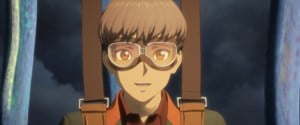
Christopher Farris
Rating:
It is cool to see Studio Orange branching out. Adapting an English-language sci-fi alternate-history novel gives them some material to work with obviously apart from a lot of other anime productions. Even aside from the studio's signature CGI stylings, Leviathan still stands out. The character designs feel streamlined, inhabiting a middle ground between anime art and more western animated sensibilities. They're mainly here to provide scale and a sense of setting for the setpieces of this story: a reimagined World War I filled out with fantastical science fiction trappings. Clanky mechanical walkers are always welcome to begin with, but then the series is busting out beautifully absurd additions like "the genetically engineered beasts created by Charles Darwin" and armies taking to the skies using giant, flying sea life. It's ostensibly bonkers, and by the time the titular giant whale zeppelin comes into view at the end of this first episode, it's almost all worth it.
That's just the act of getting there though. There is a sense in this initial entry that Leviathan might be leading primarily with style, not so much substance. Only a little characterization context is given for the first lead, Aleksander, as history conspires to orphan him in his own country with his handlers mainly repeating how he needs to "get in the robot." Even less is here for the gender-disguised Dylan, who hops into the army to pilot a super-fast jellyfish and winds up just carried around in the sky for most of the episode. There is some fine environmental storytelling early on, thanks to some strong background work overall, and there are allusions to the family circumstances of both these main characters that will hopefully inform things a little more impressively as the show goes on. But for now it's all about just seeing these wacky walking machines and sky fish in action.
As I said though, that's almost enough. Having proven themselves on all manner of other material, Orange now gets to earnestly show off animating magnificent mechanized walkers here in Leviathan—and it's a treat. Aleksander's walker moves with smooth, clanky personality that already has me salivating at the prospect of them showing off even more as they continue. Meanwhile, the scenes of Dylan floating on in the jellyfish are downright placid, by comparison, but communicate the dissonant serenity of being lost in the open sky. It almost lends enough character just seeing how she relishes being up there, despite the technically desperate circumstances. As a taste, it's all tantalizing.
That said, I feel like Leviathan can look too smooth at times. Orange's approach lends little of the grit and graininess I associate with the historical hard times of WWI. None of the characters look like they've gotten anywhere near a trench. There hasn't been a lot of fighting yet in this prewar point, sure, but there's also no foregrounded feeling of scrappy, rugged violence. It feels too clean. Maybe that's intentional, and things will get more grimy and shredded as the leads are drawn into the harrowing realities of war once that starts. For now, this first episode feels less like a proper prologue and more like a shiny tech demo with a whiff of story behind it. Pretty sharp-looking tech demo, though.

Rating:
I guess I can't complain too hard about things feeling smooth and uneventful in Leviathan as the second episode sees the war begin in earnest and the bodies start hitting the floor. Both main characters see some affecting deaths to bring home to horrors here. Though I'll be honest, I'd kind of already forgotten about Aleksander's tertiary hanger-on, Hoffman. I'm sure he'll be missed.
Really, Alek's segments of Leviathan feel lesser and like a liability to the storytelling, to me. I haven't read the original Scott Westerfield novel, but these portions of the plotting have a lot of earmarks of simpler writing through-lines that don't serve a dense, sprawling war story as effectively, vibes-wise. Alek's main mission is to learn how to pilot the walker at running speed at night, so naturally that's the precise situation he has to engage with so he and his handlers can sneak across the Switzerland border. It doesn't help that, while I can sympathize with Alek having his life "flip turned upside-down", he still comes off as a sheltered royal brat in a lot of his interactions. Volger even has to shock some sense into him with the Bright Noa special at one point. I do like some of the details about the walker incorporated into this side of the story, with the rhythm-based movement system and characters intermittently commentating on the interstitial impracticality of using a giant robot walker in this situation. Plus those little horse-mechs in the action scene are neat. But it still feels slimmer than I'd hope for from a hefty war story.
Dylan, thankfully, is supporting her side of things much more robustly. As much as y'all know I love me some robots, I was shocked to find myself getting extra-invested in the freaky bioengineered animal action happening in these sections. It leans into that appreciably fresh, unique material I complimented coming into the setting in the first episode—showing off impressively thought-out bio-technical details of something like a giant whaleship. And that's before combat breaks out and viewers are treated to soldiers clambering around on the side of this big beastly skyboat and sending off anit-aircraft bat bombs in the middle of a dogfight. It's the kind of gonzo alt-history imaginativeness I didn't even realize I'd been craving.
Even in the calmer moments, Dylan's just more compelling though. The connection she forges with scientist Barlow provides some niftily manifold moments of reevaluating personal biases—and she overall feels more motivated in proving herself and moving forward compared to Alek's struggles to get over his status displacement. Also, it's just cool watching Dylan parkour around while dangling from a soaring sea creature—that's a cool skill they already set up in the first episode and I look forward to seeing her do more of it. These are the kind of escalations I was hoping for once Leviathan got going, but it's still not all the way there yet. This is a full-season Netflix drop of a book adaptation though—it's got plenty of building-up left to do as it goes.
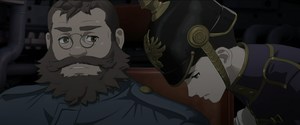
James Beckett
Rating:
Given their spectacular work on Land of the Lustrous, BEASTARS, and Trigun Stampede, I have become a diehard supporter of Studio Orange. Their particular take on 3D animation has made them one of the most cutting-edge studios in the anime industry; they've also demonstrated a keen eye for adapting manga into a markedly different mode by retaining the elements of the source material that works while also being willing to adapt and invent their own elements that suit the cinematic presentation they often aim for. Qubic Pictures has a much sparser track record by comparison, with their only major works beyond some notable independent shorts being an entry in the Star Wars: Visions anthology and a decent Netflix mini-series called Eden. Both Orange and Qubic are interested in pushing the boundaries of conventional anime production and aesthetics, though, so a collaboration makes perfect sense. All of this is to say that, when it comes to Leviathan, I went into the newest animated Netflix Original assuming that I would love it on a technical level.
Based on the first episode, I think I was safe to be so hopeful. The lively character animation, expressive faces, painterly backgrounds, and dynamic camera movements all demonstrate Leviathan's cinematic ambitions. It is worth noting that this premiere represents merely the beginning of one story arc, as every four of Leviathan's 12 episodes will be adapting one of the novels from Scott Westerfield's trilogy of young adult novels, so there isn't a whole lot in the way of bombastic spectacle to show off what Orange and Qubic are capable off. Our two leads each get a minor bit of action in their halves of the story—Prince Alek and his two guardians get caught up in a Clanker battle while they flee Austria-Hungary, while Deryn gets swept away by one of the giant floating jellyfish that the UK makes use of in its forces. They're fun teasers of what's to come, but that's about it.
If I have any reservations about Leviathan so far, they come from that same sense of feeling like I've only barely just started the story before the credits of Episode 1 start to roll. Now, I am not complaining that the first episode of an adaptation of a novel trilogy only gets so far in its retelling. I'm more dissatisfied with the pace and presentation of this opening chapter, and it feels more like a symptom of the Netflix-ification of streaming media than anything else.
When my anime is divided up into episodes, I like them to feel just so—like single, episodic chapters of a larger story. Over the years, Netflix Originals have come to be written and edited more like bloated films that just get arbitrarily sliced into pieces every twenty-five minutes or so. This is the impression that Leviathan's first episode gives. It has only just begun even to introduce its fascinating alternate-history version of WWI and the two very different adventures that Prince Alek and Deryn are setting off on when it doesn't come to a natural stopping point, so much as it just stops. I do not doubt that, when I begin the next episode, it will feel less like the beginning of the next part of the story and more like we're picking up exactly where this premiere cut off.
That said, I'm still very excited to see where Leviathan goes from here. I love the universe's diesel-punk/mad-science spin on the events of World War I, and you know I am always eager to see the new ways Studio Orange comes up with to showcase their talents for each new project. Alek and Deryn's story is off to a good start, even if I suspect it will work much better if I just watch each of the four-episode arcs in one sitting. Almost, you know, like a trilogy of movies?
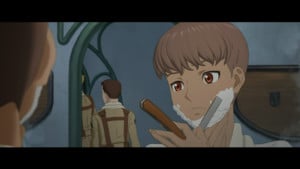
Rating:
Just as I thought, watching Episode 2 of Netflix's Leviathan feels very much like resuming a movie that got paused twenty minutes in for a bathroom break. We're immediately tossed back into Prince Alek's mission to flee his kingdom while Deryn (as “Daryl”) makes her way onto the Leviathan that she first caught sight of in the previous scene episode. Ironically, this doesn't make for a very smooth transition between episodes (the opening credits feel like they were just placed at whatever random spot technically worked as a break between scenes), but that's probably enough grousing about the standard pacing issues if Netflix Originals. How are the parallel adventures of Prince Alek and Deryn holding up in this next phase of the story?
Pretty good, I'd say. There are some quibbles I could make about the writing, particularly with some of the dialogue. Despite this being a show designed to watch in binge sessions, we get a lot of “As you know…” and “I can't believe X is happening” lines that we really don't need. At one point, Prince Alek almost casually remarks, “My parents were assassinated and now there's about to be a war,” as if the audience needs even more reminding that this is, indeed, a story about World War I.
This feels less like an issue of localization and more like something intrinsic to the script itself. Should I blame the fact that this is an adaptation of a YA novel meant for teenagers, or is this rather the endemic issue of Netflix Originals being written as “second-screen” content that viewers should be able to follow even if they're only halfway paying attention while scrolling on their phones?
Either way, the dialogue can be kind of rough (which is not a mark against the generally well-performed English dub at all). Still, while it might seem like I'm harping on the negatives of this episode in spite of my high score, it's only because the rest of Leviathan is so darned good that I want it to live up to its potential. Alek and Deryn make for excellent protagonists given the setting and nature of the conflict, and the show continues to capably build the mounting stakes of the looming war. Deryn's half of the story appropriately develops the more fantastical elements of Westerfeld's alternate history as she joins up with the Leviathan crew and gets a whale's-eye view of how the Allied Powers are preparing to enter the fray with their bioengineered weaponry. Alek is on a more grounded journey of a fugitive prince who must come to terms with his parents' murders and figure out his place on the other side of the conflict in his Clanker.
Both of our heroes' personal conflicts are much more defined as of this episode, as is the biological vs. mechanical dichotomy of the Allies and the Central Powers. The story of World War I is already fascinating and complex in its usual, everyday context. I am very eager to see how the show continues to meld its fantastical elements and its empathetic characters with the real-world cataclysms of one of the deadliest conflicts in history.

Bolts (MrAJCosplay)
Rating:
Have you ever watched something that screams "cinematic"? I'm not just saying that because of the premiere's letterbox format. No, everything, from the pacing to the dialogue to the musical score, teleported me to my own little personal theater. This is a series about the brewing conflict of war, and yet, there is a weird sense of comfort to the show so far. I've fallen in love with every character on screen in such an effortless way, and that doesn't happen too often. When two attendants knocked Alek out after discovering what happened to his parents, I thought, “Awww, I like these guys.” I was relieved when we discovered that the two attendants who struck him had done so to help Alek along, not harm him.
I think this is commendable, considering that this premiere only gives a taste of what I can only imagine will be a much grander and more involved story, throwing us into the catalyst of a larger conflict. We have brewing political conflicts, developmental forces in other countries, and some unique elements that help this world stand out, particularly in its use of large creatures as vehicles. There hasn't been any overwhelming wall of exposition, but I'm sure we'll get to that at some point later. For now, I'm deeply invested in the conflict of our young protagonists, despite their very different beginnings.
There's so much attention to detail here, and you can tell that Studio Orange took their time with nailing the presentation. The backgrounds look absolutely gorgeous, the mech designs look fun, and the attention to detail with the CG character models is impeccable. I'm also really impressed that the English dub feels so seamless, despite the more detailed mouth movements. Kudos to the dub team for going the extra mile to ensure that everyone's accents sounded appropriate and authentic. In some ways, it felt like I was watching the opening minutes of an amazing DreamWorks or Pixar movie, but I imagine this series will get a lot darker than those types of films. This is the type of premiere that accomplishes so much with so little.
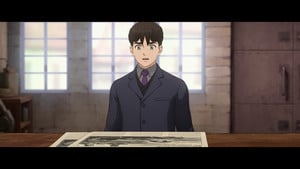
Rating:
It's interesting seeing the tension of an impending war build from different perspectives. While Alek and Dylan's arcs seem pretty typical, I'm still drawn in by the heartfelt execution and cinematic pacing. Episode one was a bit slow, outside of establishing the starting points of our two leads, but now we're actually starting to see forward momentum in where they'll end up. The interesting thing is that we know that war is imminent, but we're still lacking the definitive turning point where everything actually goes to hell. I appreciate how this episode highlights this by showing us more civilians and how something major, such as a political assassination, can occur without anyone really caring until it directly impacts them.
Alek's arc appears to be centered on transitioning out of his privileged lifestyle. His trauma is reasonable, especially considering how fresh it is. Still, he needs to transition into this leadership position for the eventual army that he will need to command. I like the payoff here; it's clear why they need to keep the walker, even if it runs the risk of making them a bigger target, which becomes apparent towards the end of this episode. It's not just about making sure that Alek's is safe; it's about making sure that he has everything he needs to fight back. Things are very unfair for him because he doesn't really have a say in his circumstances, and he is suddenly being asked to take on responsibilities even an average teenager or young adult would never be asked to do. That scene where he gets slapped and tries to be intimidating, only to realize that he can't rely on his father to fight back for him, was very chilling, but powerful.
Dylan's arc seems to be about the loss of innocence. She's enamoured with the different vehicle beasts and what makes them tick. You get the sense that she isn't really built for war in the violent sense or even in a national sense. She's just very fascinated with the things that are used to facilitate war. It's scary because she's already starting to see what these great technological marvels are actually going to be used for, and I'm curious at what point she's going to cross the line of return. Additionally, I knew that her decision to keep her identity a secret wouldn't last for very long. It's nice that she has an ally in somebody who has a similar fascination with these creatures. Maybe she'll take up a scientist role instead of a soldier, which she seems more suited for.
I know I've used this analogy a few times in the past, but it really does feel like I'm watching someone slowly wind up that guitar string. So far, every episode has been packed with content without feeling overwhelming, but despite that, we're still in the rising tensions portion of the series. Things felt claustrophobic, and I'm wondering if there will come a point where we can actually breathe a sigh of relief moving forward.
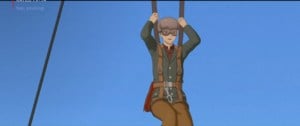
Caitlin Moore
Rating:
I haven't read the novel Leviathan by Scott Westerfeld, but from what I've read in my research (what, you don't do research about new anime every season?), it seems like a natural choice for an anime adaptation. It's drawn comparisons to the movies of Hayao Miyazaki—not for the “chill vibes” sanded-down version that aesthetic blogs and AI bros are fond of, but for its depiction of war and love of flight as well as the European countryside. It features an alternative version of World War I fought with mechs and flying sea creatures instead of tanks and trenches. It's the perfect fusion of Eastern and Western historical fantasy.
As much as I would love a lavish hand-drawn version of the story and setting a la Future Boy Conan or Nadia - The Secret of Blue Water, I have accepted the changing times in my heart with serenity. Plus, if anyone is going to do a fully CG version of a story like this, it's for the best that it goes to Orange. They're simply the best in the business when it comes to CG anime: the cell shading keeps things from looking plasticky, the characters look and move like human beings, and the world retains a sense of weight and texture. For a historical science fiction/fantasy story involving flight and giant machinery like Leviathan, those are extraordinarily important! And for the most part, it succeeds, with the exception of a few moments where the impacts felt like they lacked… well, impact.
It also feels very much like a young adult series. While sometimes anime ages feel completely arbitrary, the two main characters of Leviathan, Dylan and Aleksandr, are teenagers through and through; Aleksandr, the now-orphaned son of assassinated nobility (unnamed, but definitely Archduke Franz Ferdinand) is more timid, while Dylan is as brash as you'd expect of a young woman posing as a boy to join the military. Though their paths have yet to cross, which I'm sure they will, that's the classic combination for YA of the book's era. I honestly love that about it; it's like a fusion of the two mediums that most formed my identity as a teenager. It feels like a show I could sit down and watch with a preteen relative without getting suddenly hit by the cringing feeling of viewing out-of-place fan service with someone younger who shares my bloodline.
Episode one was all set-up, building a world and story that has my interest but has yet to grab me. Perhaps it'll light the spark in my heart once our two protagonists meet.
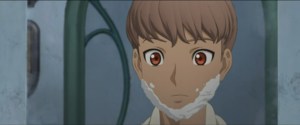
Caitlin Moore
Rating:
Dang it! They didn't meet yet! The episode ends with both of them ending up in the Alps, so they're getting closer, but I feel in my heart that Leviathan won't truly begin until Dylan and Alek encounter each other. Two teenagers from opposite sides of the war, both of them in confusing situations they never could have planned for? Volger and Klopp have death flags flapping over their heads so hard they're practically in a gale, and the boys surrounding Dylan on the Leviathan barely have names.
With this lingering feeling that the story still has yet to truly begin, I'm having a hard time fully sinking into the world of Leviathan. This episode offers some cool new details, especially the use of bioengineering to create living weaponry. Even if I am concerned about the ethical implications of turning animals into instruments of war, I can't complain about a lack of imagination in the setting! Alek's nighttime battle with his pursuers also has plenty of juice, as the animators take full advantage of the computer animation to create a sense of tension, kineticism and speed as he struggles to overcome his fear and just run.
But Alek needs a foil to truly come alive as a character. Dylan is plenty dynamic on her own; she bears a stunning resemblance in personality and situation to Alanna of the Song of the Lioness tetralogy, one of my favorite protagonists ever. She's resourceful, tenacious, and determined. Alek, however, is top to bottom a sheltered princeling. His emotional situation makes sense; however, Klopp and Volger are mentors and not peers. They're there to guide him, support him, and occasionally yell at him, but his relationship with them will never sparkle on the screen. He needs someone his own age but with the opposite personality… perhaps a feisty young woman who wanted to be an aviator so badly she disguised her own gender?
Maybe the reason it's not quite hitting for me is a lack of energy. Orange's CG is the best in the anime business, that's never in doubt; however, when I mentally compare it to, say, Trigun Stampede, there's something missing. This is Christophe Ferreira's first time directing, and he's worked primarily in two-dimensional animation up until now; perhaps he's struggling to take advantage of the medium, much like how Volger's voice actor is a respected stage actor but comes across as flat in his voiceover role.
Or maybe I'm just old.
discuss this in the forum (361 posts) |
this article has been modified since it was originally posted; see change history
back to The Summer Anime 2025 Preview Guide sponsored by Crunchyroll
Season Preview Guide homepage / archives